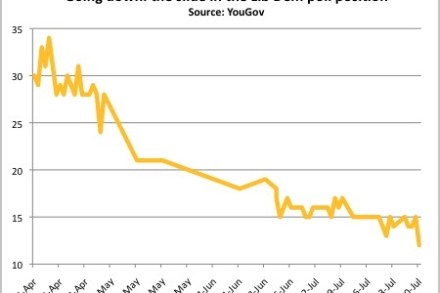The coalition’s Lib Dem conundrum
Yesterday, a “source close to the Prime Minister” told the Telegraph that we shouldn’t bother much with the opinion polls as at the moment. As they put it, “we’re only a few weeks into a new Parliament and we’ve got nearly five years to go before everyone really has to worry about the polls again.” But, make no mistake, there will be Lib Dems who are deeply concerned by how their party is polling at the moment. The YouGov poll in today’s Sunday Times, which has the yellow bird of liberty stuttering along at 12 percent, only underlines a remarkable decline since the election campaign (see chart above). The pressure
















